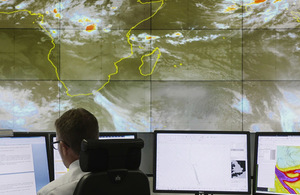UK aid to help protect one billion people from impact of extreme weather
New £175 million package will help make people safer and better prepared for disasters such as typhoons and hurricanes, as well as dealing with the aftermath.

-
UK co-creating partnership to protect one billion people in the developing world from extreme weather.
-
A new £175 million package will help make people safer and better prepared for disasters such as typhoons and hurricanes, as well as dealing with their aftermath.
-
UK and Egypt urgently call for the world to step up preparations for the impact of climate change.
The UK Government is co-creating a global partnership to help protect one billion people in developing countries from the impact of extreme weather events, International Development Secretary Alok Sharma announced today.
The Risk-Informed Early Action Partnership will help ensure the world’s poorest people receive earlier warnings of potential disasters such as typhoon and hurricanes – and are better prepared to deal with their effects.
International Development Secretary Alok Sharma, today [September 22] announced £85 million in funding to the partnership. He said:
Climate change is one of the greatest challenges the world is facing, and the world’s poorest will be the worst hit.
Early warning systems save lives. Helping developing countries to protect against the impact of extreme weather will ensure that the world’s poorest are better able to cope with disasters in the future.
Working with countries across the world and organisations like the UK Met Office and International Federation of the Red Cross and Crescent, the Partnership will improve the availability and quality of weather forecasting information available.
Better information and early warning systems will give people more time to adapt and prepare for extreme weather events, making them easier to predict.
The Partnership will also help the governments of developing countries to make detailed action plans for natural disasters, including ensuring survivors are safe and have access to food, water and shelter.
The UK, working with IFRC and Finland, has led on setting up the Partnership.
At the UN in New York, both the UK and Egypt called for urgent global action to help the world adapt to the effects of climate change.
Speaking at the UN, The International Development Secretary also announced up to £90 million of support for the Global Risk Financing Facility, which will help cut the costs of disaster risk insurance. It will help governments and humanitarian agencies to access funding quicker, ensuring a faster and more effective response in emergencies.
The UK is also leading the charge to make infrastructure more resilient to climate change. Working with Jamaica, insurance company Willis Towers Watson, and the World Economic Forum the UK has brought together organisations to ensure that we work to make buildings, roads, bridges and transport networks fit to withstand climate shocks.
Notes to editors:
The UK is committing £175 million to help make people safer from and reduce the impact of disasters.
This is made up of:
-
£85 million through the Risk-Informed Early Action Partnership, a new global partnership of governments and humanitarian and climate experts to help protect one billion people from disaster.
-
£90 million to the Global Risk Financing Facility. Co-funded by Germany and delivered by the World Bank, it will use financing services such as insurance to help governments and humanitarian agencies access funding more quickly to support a faster, more effective response in emergencies.
The International Development Secretary also announced a new Coalition for Climate Resilient, alongside Jamaica insurance company Willis Towers Watson, and the World Economic Forum. This coalition brings together 38 countries, institutions and companies with trillions of assets to ensure infrastructure is designed to withstand climate shocks.
The Secretary of State also pledged to give £61 million at the UN to develop crops, which are better adapted to grow in higher temperatures, can withstand droughts or floods, and have natural resistance to pests and diseases.
These crops are developed specifically for the most vulnerable countries in Asia and Africa. This is made up of:
-
£30 million to global agricultural research organisation CGIAR, to support the development and delivery to poor farmers of new crops which are more productive, climate and disease-resistant, and are more nutritious.
-
£13 million for developing disease resistant, nutrient-enriched wheat through the International Maize and Wheat Improvement Centre.
-
£18 million, which will go to the Centre for Agriculture and Bioscience International to support the tracking of plant pests and diseases; the International Centre of Insect Physiology and Ecology to support pest control work; and the World Vegetable Centre to breed vegetables varieties better adapted to future climate.
General media queries (24 hours)
Email [email protected]
Telephone 020 7023 0600
If you have an urgent media query, please email the DFID Media Team on [email protected] in the first instance and we will respond as soon as possible.